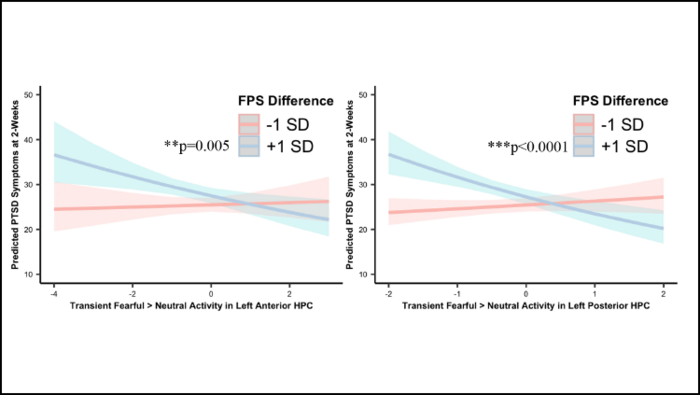After a traumatic event, people with decreased activity in the hippocampus experience worse PTSD symptoms, according to new research published in JNeurosci.

Credit: Tanriverdi et al., JNeurosci 2022
After a traumatic event, people with decreased activity in the hippocampus experience worse PTSD symptoms, according to new research published in JNeurosci.
The hippocampus does more than encode new memories — it also takes stock of spatial and emotional contexts and processes threat. PTSD impacts all of these functions, generating symptoms like the overgeneralization of fear and recurrent traumatic memories. Yet the exact interplay between the hippocampal activity and PTSD was unclear.
Tanriverdi et al. measured PTSD symptoms and hippocampal activity in people who had visited the emergency room after a traumatic event like a car crash. Participants answered a questionnaire about PTSD symptoms, then they viewed frightened and neutral faces while the researchers measured their brain activity with fMRI. People with more severe PTSD symptoms had decreased activity in the hippocampus in response to the frightened faces. This relationship strengthened in people who startled more easily in a defensive learning task. For these participants, their hippocampus may not be discriminating between safe and unsafe contexts. These results indicate certain individuals may be more susceptible to PTSD because of impaired activity in their hippocampus.
###
Paper title: Hippocampal Threat Reactivity Interacts with Physiological Arousal to Predict PTSD Symptoms
Please contact [email protected] for the full-text PDF and to join SfN’s journals media list.
About JNeurosci
JNeurosci, the Society for Neuroscience’s first journal, was launched in 1981 as a means to communicate the findings of the highest quality neuroscience research to the growing field. Today, the journal remains committed to publishing cutting-edge neuroscience that will have an immediate and lasting scientific impact, while responding to authors’ changing publishing needs, representing breadth of the field and diversity in authorship.
About The Society for Neuroscience
The Society for Neuroscience is the world’s largest organization of scientists and physicians devoted to understanding the brain and nervous system. The nonprofit organization, founded in 1969, now has nearly 37,000 members in more than 90 countries and over 130 chapters worldwide.
Journal
JNeurosci
DOI
10.1523/JNEUROSCI.0911-21.2022
Method of Research
Observational study
Subject of Research
People
Article Title
Hippocampal Threat Reactivity Interacts with Physiological Arousal to Predict PTSD Symptoms
Article Publication Date
25-Jul-2022
COI Statement
Dr. Ressler has served on advisory boards for Takeda, Resilience Therapeutics, Janssen and Verily/Google. His research has been sponsored by Alkermes and Brainsway and he has worked as a consultant for Alkermes. In the last three years, Dr. Clifford has received research funding from the NSF, NIH and LifeBell AI, and unrestricted donations from AliveCor, Amazon Research, the Center for Discovery, the Gordon and Betty Moore Foundation, MathWorks, Microsoft Research, the Gates Foundation, Google, One Mind Foundation, and Samsung Research. Dr. Clifford has financial interest in AliveCor and receives unrestricted funding from the company. He also is the CTO of MindChild Medical and CSO of LifeBell AI and has ownership in both companies. These relationships are unconnected to the current work. Dr. Germine is on the scientific advisory board of the nonprofit Sage Bionetworks, for which she receives a small honorarium. Dr. Sheikh has received funding from the Florida Medical Malpractice Joint Underwriter’s Association Dr. Alvin E. Smith Safety of Healthcare Services Grant, Allergan Foundation, the NIH/NIA-funded Jacksonville Aging Studies Center (JAX-ASCENT; R33AG05654), the Substance Abuse and Mental Health Services Administration (1H79TI083101-01), and the Florida Blue Foundation. Dr. Jones reports no direct conflicts related to this paper, and no ongoing conflicts. He has been an investigator on studies funded by Hologic Inc, Janssen, and AstraZeneca, for which his department has received research funding. Over the past 3 years, Dr. Pizzagalli has received consulting fees from BlackThorn Therapeutics, Boehringer Ingelheim, Compass Pathway, Concert Pharmaceuticals, Engrail Therapeutics, Neurocrine Biosciences, Otsuka Pharmaceuticals, and Takeda Pharmaceuticals; one honorarium from Alkermes, and research funding from Millennium Pharmaceuticals. In addition, he has received stock options from BlackThorn Therapeutics. No funding from these entities was used to support the current work, and all views expressed are solely those of the authors. Dr. Elliott reports support from the National Institutes of Health (NIH) through Grant Numbers R01HD079076 & R03HD094577, Eunice Kennedy Shriver National Institute of Child Health & Human Development, National Center for Medical Rehabilitation Research, and South Wales Health Spinal Cord Injury Research Grants Program. In the past 3 years, Dr. Kessler was a consultant for Datastat, Inc., RallyPoint Networks, Inc., Sage Pharmaceuticals, and Takeda. The remaining authors report no financial relationships with commercial interests.




